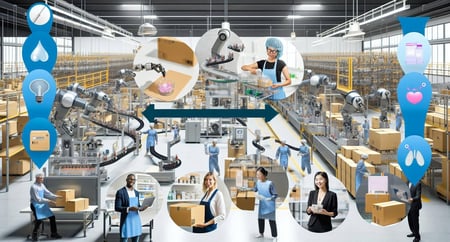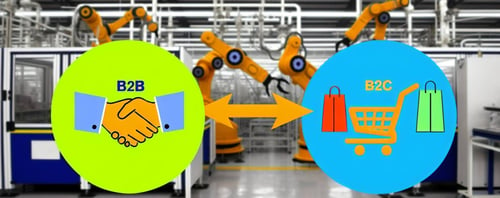Shift from B2B to B2C
The winds of change blow stronger than ever in medical manufacturing. As plant managers, you're no stranger to adaptation. However, the recent shift from Business-to-Business (B2B) to Business-to-Consumer (B2C) dynamics presents a unique set of challenges and opportunities.
In this blog, we will look into the intricacies of this transition, offering insights and strategies tailored to your role. Moreover, we'll explore the crucial role of integration between PlanetTogether and leading ERP solutions like SAP, Oracle, Microsoft, Kinaxis, and Aveva in optimizing operations for this new paradigm.

Embracing the B2C Shift
Traditionally, medical manufacturing has been predominantly B2B-focused, catering to healthcare providers, institutions, and distributors. However, with evolving consumer preferences and advancements in technology, the industry is witnessing a notable shift towards B2C models. Direct-to-consumer sales, personalized healthcare solutions, and the rise of e-commerce platforms are reshaping the sector's landscape.
Understanding the Implications
As a Plant Manager, grasping the implications of this transition is essential. Unlike B2B transactions, B2C demands greater agility, scalability, and customization. The production environment must adapt to fluctuating demand patterns, shorter lead times, and a diverse product portfolio. Moreover, customer-centricity becomes a focal point, requiring seamless coordination between production, distribution, and customer service channels.


Leveraging Technology: Integration between PlanetTogether and ERP Solutions
Integration between production planning systems like PlanetTogether and ERP solutions plays a pivotal role in streamlining operations for the B2C era. By synchronizing data and processes across the supply chain, these platforms enable real-time visibility, predictive analytics, and agile decision-making.
Let's explore how integration with leading ERP solutions enhances efficiency and responsiveness:
SAP Integration: SAP's robust suite of tools complements PlanetTogether's production planning capabilities by providing end-to-end visibility, resource optimization, and demand forecasting. Seamless integration streamlines order processing, inventory management, and financial transactions, ensuring alignment between production and business objectives.
Oracle Integration: Oracle's ERP solutions offer a comprehensive framework for managing complex manufacturing operations. Integration with PlanetTogether facilitates dynamic scheduling, capacity planning, and inventory control. By leveraging Oracle's advanced analytics and AI-driven insights, plant managers can optimize resource utilization, minimize production costs, and enhance product quality.
Microsoft Integration: Microsoft's ERP ecosystem, including Dynamics 365, empowers plant managers with a unified platform for production planning, supply chain management, and customer engagement. Seamless integration with PlanetTogether facilitates data synchronization, workflow automation, and collaborative decision-making. Leveraging Microsoft's cloud infrastructure and productivity tools, manufacturers can adapt to changing market dynamics with agility and resilience.
Kinaxis Integration: Kinaxis RapidResponse offers a unique approach to supply chain planning, leveraging concurrent planning and scenario analysis capabilities. Integration with PlanetTogether enables seamless data exchange, scenario synchronization, and supply chain visibility. By harnessing Kinaxis' real-time insights and predictive modeling, plant managers can anticipate demand fluctuations, mitigate risks, and optimize inventory levels.
Aveva Integration: Aveva's Manufacturing Execution System (MES) complements PlanetTogether's production planning capabilities by bridging the gap between planning and execution. Integration enables seamless data transfer, work order management, and process orchestration. Leveraging Aveva's MES, plant managers can monitor production performance, enforce quality standards, and drive continuous improvement initiatives.

Key Considerations for Integration
While integration between PlanetTogether and ERP solutions offers significant benefits, it's essential to address key considerations to ensure successful implementation:
Data Integration: Establishing robust data integration mechanisms is critical to synchronizing information across disparate systems. Define data mappings, data transformation rules, and validation protocols to maintain data integrity and consistency.
Process Alignment: Align production planning processes with ERP workflows to facilitate seamless data exchange and process automation. Identify integration touchpoints, workflow dependencies, and exception handling mechanisms to streamline operations.
Change Management: Engage stakeholders proactively and communicate the benefits of integration to gain buy-in and support. Provide training and support to users to navigate the new systems and processes effectively.
Scalability and Flexibility: Design integration architecture with scalability and flexibility in mind to accommodate future growth and evolving business requirements. Leverage APIs, middleware platforms, and cloud-based solutions to enable interoperability and adaptability.
The transition from B2B to B2C represents a fundamental change for medical manufacturing, presenting both challenges and opportunities for plant managers.
By embracing technology and fostering integration between PlanetTogether and leading ERP solutions, plant managers can optimize operations, enhance agility, and drive competitive advantage in the B2C era. As pioneers of change, seize the opportunity to redefine manufacturing excellence and shape the future of the industry.
Remember, the journey towards B2C success begins with a single step—integration. Are you ready to take your manufacturing operations to the next level? Contact us today to learn more about how PlanetTogether and integrated scheduling solutions can help you achieve your sustainability goals and drive success in your industry.























LEAVE A COMMENT